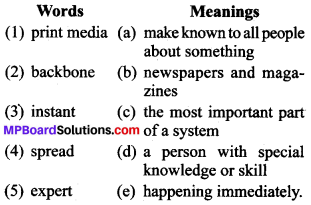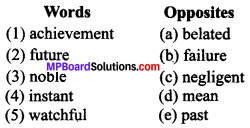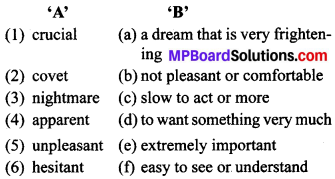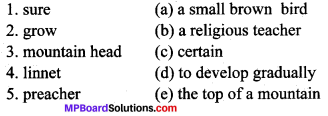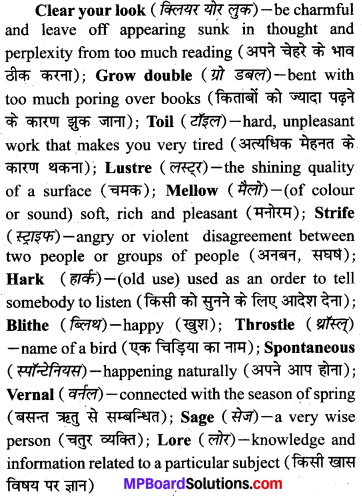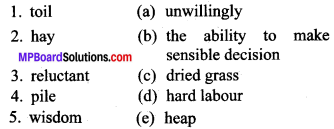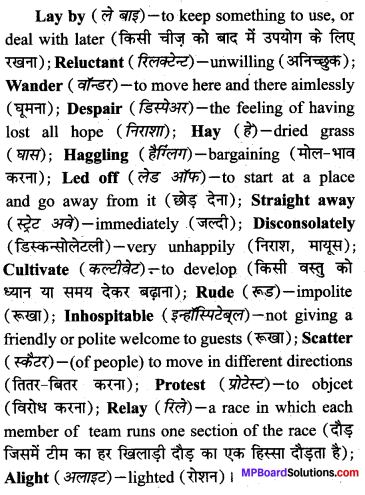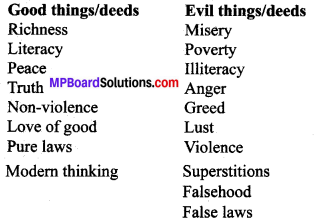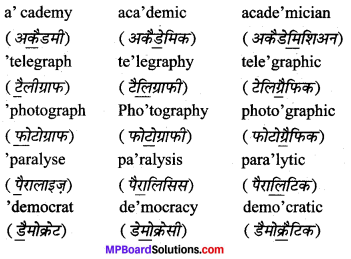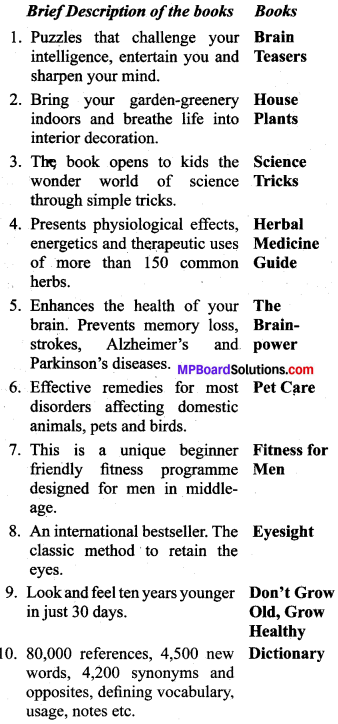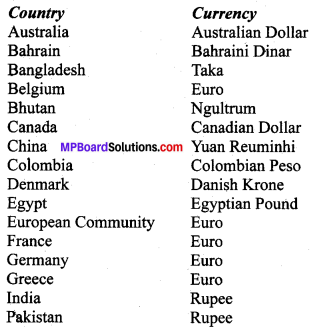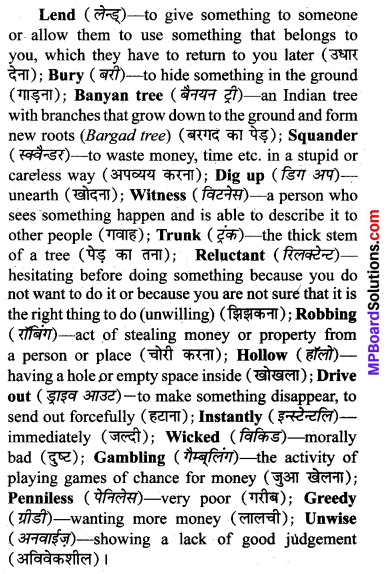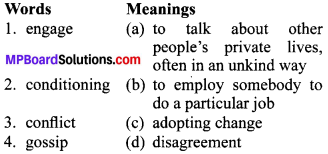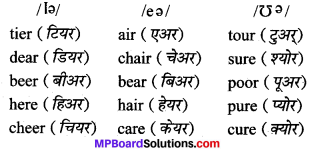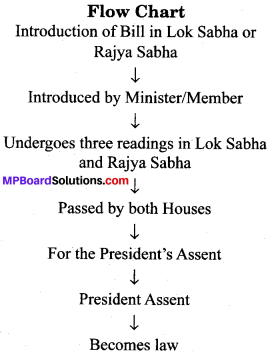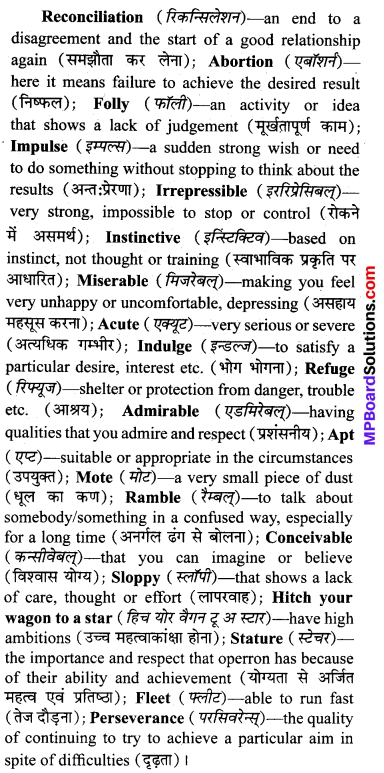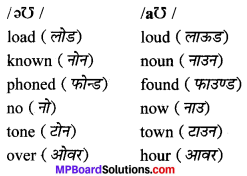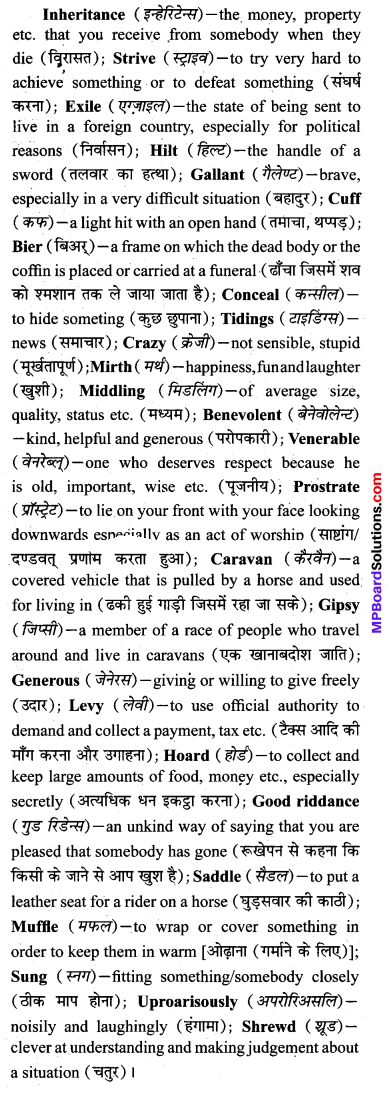MP Board Solutions for Class 9 Textbook General English The Spring Blossom Solutions Chapter 12 King Vikram in Disguise Questions and Answers aids you to prepare all topics in it effectively. You need not worry about accuracy of Madhya Pradesh State Board Solutions for Class 9 English Composition: Visual Stimulus as they are given adhering to latest exam pattern and syllabus guidelines. You Can Download MP Board Class 9 English Solutions Questions and Answers, Notes, Summary, Guide pdf on is page. Enhance your subject knowledge by preparing from Chapterwise MP Board Solutions for Class 9 English and clarify your doubts on corresponding topics.
MP Board Class 9th General English The Spring Blossom Solutions Chapter 12 King Vikram in Disguise
Kick start your preparation by using our online resource Madhya Pradesh State Board Solutions for Class 9 Textbook General English The Spring Blossom Solutions Chapter 12 King Vikram in Disguise. You can even download MP Board Solutions for Class 9 English free of cost rough direct links available on our page. Clear your queries and understand concept behind in a simple manner. Simply tap on concept you wish to prepare chapterwise and go rough it.
King Vikram in Disguise Textual Exercises
Word Power
(1) Match these words in column ‘A’ with their meanings in column ‘B’
(सुमेलित करो।)
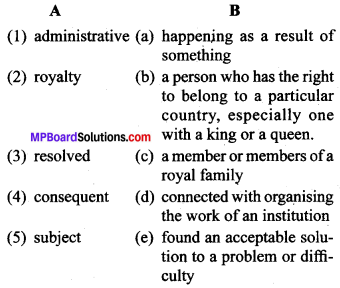
Answer:
(1) → (d)
(2) → (c)
(3) → (e)
(4) → (a)
(5) → (b)
(2) Use the letters of the given word, in any order, to derive five new words.
(दिए गए शब्दों से पाँच नए शब्द बनाइए।)
Answer:
- accompanied – pain, panic, come, coined, maid.
- administrative – trait, minister, sad, man, name.
- persuasion – super, son, sun, person, run
- graciously – rag, lag, soil, coil, soul
- subjects – set, but, sect, tub, best
- consequent – use, consent, quote, sent, count.
(3) Find words from the lesson which mean the following
(अध्याय में से वे शब्द ढूँढ़िए जिनके अर्थ निम्नवत् हों।)
Answer:
- to behave in a particular way to make other people believe something that is not true – pretend.
- a person whose job was to walk through a town shouting news, official announcements, etc. – town crier.
- sadness that one shows and feels because somebody had died – mourning.
- the act of persuading somebody to do something or to believe something. – persuasion
- to impress somebody a lot with you beauty or skill – perfect presentation.
How Much Have I Understood?
(1) Answer these questions in one or two sentences.
(निम्न प्रश्नों के उत्तर एक या दो वाक्यों में दो।)
Question 1.
Who was king Vikramaditya?
(हू वॉज़ किंग विक्रमादित्य?)
राजा विक्रमादित्य कौन थे?
Answer:
King Vikramaditya was a just and fair ruler of the kingdom of Ujjain.
(किंग विक्रमादित्य वॉज़ अ जस्ट एण्ड फेयर रुलर ऑफ द किंगडम ऑफ उज्जैन।)
राजा विक्रमादित्य उज्जैन राज्य के न्यायप्रिय शासक थे।
Question 2.
What did the king see through the crack in the wall of the hut?
(व्हॉट डिड द किंग सी श्रू द क्रैक इन द वॉल ऑफ द हट?)
राजा ने झोंपड़ी की दरारों में से क्या देखा?
Answer:
The king saw a weeping old man in a corner, a head shaven women dancing and a young man who appeared to be in mourning singing.
(द किंग सॉ अ वीपिंग ओल्ड मैन इन अ कॉर्नर, अ हैड शेवन वुमन डान्सिंग एण्ड अ यंग मैन हू अपीयर्ड टू बी इन मोर्निंग सिंगिंग।)
राजा ने एक बूढ़े आदमी को एक कोने में रोते देखा एक मुंडे बाल वाली स्त्री को नाचते व एक शोकाकुल नवयुवक को गाते देखा।
Question 3.
Why was the young man mourning?
(व्हाय वॉज़ द यंग मैन मोर्निग?)
नौजवान मातम क्यों मना रहा था?
Answer: The young man was mourning because his father had spent all his money on educating him so that he could get a job of a scribe in the court but no post was available. So he was jobless and they were hand to mouth.
(द यंग मैन वॉज़ मोर्निग बिकॉज हिज़ फादर हैड स्पैन्ट ऑल हिज़ मनी ऑन एजुकेटिंग हिम सो दैट ही कुड गेट अ जॉब ऑफ अ स्क्राइब इन द कोर्ट बट नो पोस्ट वॉज़ अवेलेबल। सो ही वॉज़ जॉबलेस एण्ड दे वर हैण्ड टू माऊथ।)
नौजवान मातम मना रहा था क्योंकि उसके पिता ने अपना सारा धन उसकी शिक्षा पर खर्च कर दिया था ताकि वह दरबार में नकलनवीस का पद पा सके। परन्तु कोई पद खाली न था। इसलिए वह बेकार था और वे भूखे मर रहे थे।
Question 4.
Who were the members of the young man’s family?
(हू वर द मेम्बर्स ऑफ द यंग मैन्स फैमिली?)
Answer:
The members of the young man’s family were his father and a wife.
(द मैम्बर्स ऑफ द यंग फैमिली वर हिज़ फादर एण्ड अ वाईफ।)
नौजवान के परिवार में उसके पिता व एक पत्नी थी।
Question 5.
What was the topic given by the king for the examination?
(व्हॉट वॉज़ द टॉपिक गिवन बाइ द किंग फॉर द इग्जैमिनेशन?)
परीक्षा के लिए राजा द्वारा कौन-सा शीर्षक दिया गया था?
Answer:
The topic was ‘a young widow dancing to the time of merry songs sung by a young man in mourning while an old man wept.’
(द टॉपिक वॉज़ ‘अ यंग विडो डान्सिंग टू द ट्यून ऑफ मैरी साँग्स संग बाइ अ यंग मैन इन मोर्निंग एन ओल्ड मैन वेप्ट।)
शीर्षक था ‘एक नौजवान विधवा एक शोकाकुल नौजवान द्वारा गाये गए गीतों पर नाच रही है व एक बूढ़ा रो रहा है।
(II) Answer these questions in three or four sentences
(निम्न प्रश्नों के उत्तर तीन या चार वाक्यों में दीजिए।)
Question 1.
What did the king hear that night? What did he do then?
(व्हॉट डिड द किंग हिअर दैट नाईट? व्हॉट डिड ही डू देन?)
राजा ने उस रात क्या सुना? उसने फिर क्या किया?
Answer:
The king heard a strange music from a hut in a poor locality. He reached the cottage and peeped in through a crack.
(द किंग हर्ड अस्ट्रेन्ज म्यूजिक फ्राम अ इट इन अ पूअर लोकैलिटी। ही रीच्ड द कॉर्टेज एण्ड पीप्ड् इन श्रू अ क्रैक।)
‘राजा ने एक गरीब मोहल्ले में एक झोंपड़ी से आते संगीत को सुना। वे उस झोंपड़ी के पास गए व दरारों से अन्दर झाँका।
Question 2.
What did the king pretend to be? Why?
(व्हाट डिड द किंग प्रिटेन्ड टू बी? व्हाय?)
राजा ने क्या होने का नाटक किया? क्यों?
Answer:
The king pretended himself to be a traveller from Java. He wanted to know the reason of all what he saw.
(द किंग प्रिटेन्डिड हिमसेल्फ टू बी अ ट्रैवलर फ्रॉम जावा। ही वॉन्टेड टू नो द रीजन ऑफ ऑल व्हॉट ही सॉ।)
राजा ने अपने आपको जावा से आया यात्री बताया ताकि उसने जो कुछ देखा था उसका कारण जान सके।
Question 3.
In your opinion why did the king announce the examination for a royal scribe immediately?
(इन योर ओपिनियन व्हाय डिड द किंग एनाउन्स द इग्जैमिनेशन फॉर अ रॉयल स्क्राइब इमीडिएटली?)
आपकी राय में राजा ने शाही नकलनवीस के लिए तत्काल परीक्षा लेने की घोषणा क्यों की?
Answer:
The king was moved by the plight of the family and especially the young man. He wanted to help him, so he immediately announced the examination for a royal scribe.
(द किंग वॉज़ मूव्ड बाइ द.प्लाईट ऑफ द फैमिली एण्ड इस्पैशली द यंग मैन। ही वॉन्टेड टू हैल्प हिम, सो ही इमीडिएटली एनाउन्सड द इग्जैमिनेशन फॉर अ रॉयल स्क्राईब।)
राजा उस परिवार के दुःख से द्रवित हो गये थे और वे उस नवयुवक की सहायता करना चाहते थे। अतएव उन्होंने तुरन्त ही शाही नकलनवीस के लिए परीक्षा की घोषणा की।
Question 4.
What was the old man’s dream? Was it fulfilled? How?
(व्हॉट वॉज़ द ओल्ड मैन्स ड्रीम? वॉज़ इट फुलफिल्ड? हाउ?)
बूढ़े आदमी का स्वप्न क्या था? क्या वह पूरा हुआ? कैसे?
Answer:
The old man’s dream was that the royalty was going to visit them at night. Yes, it was fulfilled. The king had visited them in disguise.
(द ओल्ड मैन्स ड्रीम वॉज़ दैट द रॉयलटी वॉज़ गोइंग टू विजिट देम एट नाईट। यस, इट वॉज़ फुलफिल्ड। द किंग हैड विजिटिड देम इन डिस्गाईज़।)
बूढ़े का स्वप्न था कि शाही परिवार का कोई सदस्य रात को उनके घर आयेगा। यह स्वप्न सच हुआ.क्योंकि राजा छद्मवेश में वहाँ गये।
Question 5.
Why did the young woman sell her tresses?
(व्हॉय डिड द यंग वुमन सैल हर ट्रेसेस?)
युवा महिला ने अपने बाल क्यों बेच दिए?
Answer:
The old man wanted that when royalty visited them, they should present him a silver bowl. They had no money for this. So the young woman sold her tresses.
(द ओल्ड मैन वॉन्टेड दैट व्हेन रॉयलेल्टी विजिटिड़ देम, दे शुड प्रेजेन्ट हिम अ सिल्वर बाउल। दे हैड नो मनी फॉर दिस। सो द यंग वुमन सोल्ड हर ट्रेसेस।)
बूढ़ा आदमी चाहता था कि जब शाही परिवार का सदस्य आये तो उसे चाँदी का कटोरा दिया जाय। उनके पास इसके लिए धन नहीं था। इसलिए युवा महिला ने अपने बाल बेच दिए।
(III). Choose the correct alternative
(सही विकल्प चुनो।)
(i) Vikramaditya-was the king of ……
(a) Indore
(b) Ujjain
(c) Bhopal
(d) Dhar
Answer:
(b) Ujjain
(ii) The king went out in disguise because he wanted to check on his
(a) subjects
(b) neighbours
(c) ministers
(d) princess.
Answer:
(a) subjects
(iii) The young man wanted to become the king’s
(a) friend
(b) scribe
(c) minister
(d) town-crier.
Answer:
(b) scribe
(iv) The topic for the examination was selected by
(a) the king
(b) the minister of education
(c) the competitors
(d) the health minister.
Answer:
(a) the king
(v) The king and his servant pretended to be the travellers from
(a) Sri Lanka
(b) Surinam
(c) Java
(d) Sumatra.
Answer:
(c) Java
(IV) Arrange the following sentences in the order they occurred in the story
(निम्नलिखित वाक्यों को सही क्रम में लगाओ।)
- They were hand to mouth.
- The young man came out asked them what they wanted.
- King Vikramaditya was a just and fair ruler of the kingdom of Ujjain.
- At midnight they set out for ‘Baragaza’ via the west gate.
- King Vikramaditya was deeply moved by the young man’s plight.
Answer:
- King Vikramaditya was a just and fair ruler of the kingdom of Ujjain.
- At midnight they set out for ‘Bargaza’ via the west gate.
- The young man came out and asked them what they wanted.
- They were hand to mouth.
- King Vikramaditya was deeply moved by the young man’s plight.”
Language Practices
Make meaningful sentences from the given table.
Use Passive Voice.
( तालिका से सही वाक्य बनाओ।)
Answer:
- The children were taken to the zoo.
- A cricket match was organised at the stadium.
- The injured was rushed to the hospital.
- The advertisement was published in a newspaper.
- My uniform was stitched by the tailor.
- The toys were sold at the shop.
Listening Time
Answer the questions based on the given passage.
(दिए गए गद्यांश पर आधारित प्रश्नों के उत्तर दो।)
Question 1.
Is the Kashi Express running late?
Answer:
Yes, Kashi Express is running late by three hours.
Question 2.
What time is the train expected to arrive?
Answer:
The train is expected to arrive at 17 hours.
Question 3.
What is the number of the train?
Answer:
The number of the train is 3075.
Question 4.
Which platform will it come at?
Answer:
It will come on platform number two.
Speaking Time
With the help of given flow chart, tell how to get reservation.
(दिए गए चार्ट की मदद से बताओ कि आरक्षण कैसे कराते हैं।)
Answer:
To get the reservation of a berth for the journey in a train, firstly go to the reservation office at the railway station. Take the reservation form or application form from there and fill it completely giving all the information about the date of travelling, train’s name and number, class in which you want to travel, name, age, sex etc. Handover this form to the booking clerk. If the berths are available on the given date, reservation is given otherwise the status is told. If the berths are available pay the desired sum. The clerk will then hand over the reservation ticket to you.
Writing Time
Frame a story based on the picture in the book with the help of the given clues.
(कहानी बनाओ।)
Answer:
One day a woodcutter was cutting wood in the forest. Suddenly he found a bag of gold coins there. He was an honest person. He immediately took the bag to the king. The king was very pleased to see his honesty. He returned the bag to him only.
Things to do
Question 1.
Find the kingdoms and the rulers of Central India.
(मध्य भारत के राज्य व शासकों के नाम लिखिए।)
Answer:
Student should do themselves.
(छात्र स्वयं करें।)
Question 2.
Find out any famous and interesting story related to any of the above king or queen.
(उपरोक्त दिए गए राजा या रानी से जुड़ी कोई कहानी लिखो।)
Answer:
Students should do themselves.
(छात्र स्वयं करें।)
Question 3.
Draw a picture of the throne of Vikramaditya and colour it properly.
(राजा विक्रमादित्य के सिंहासन का चित्र बनाओ व उसमें रंग भरो।)
Answer:
Students can draw and colour themselves.
(छात्र स्वयं बनाएँ।)
King Vikram in Disguise Difficult Word Meanings
fair (फेअर)-acceptable and appropriate in a particular situation उचित; subject (सब्जेक्ट)-a person who has the right to a particular country esp. one with a king or a queen ऋण; set out (सैट आउट)-leave a place and begin a journey यात्रा पर रवाना होना; pretend (प्रिटेन्ड)-to behave in a particular way, in order to hide truth सब छुपाने के लिए एक खास ढंग से व्यवहार करना, ढोंग करना; mourning (मोनिंग)- sadness that you show and feel because somebody has died family करना; persuasion (परस्युएशन)-the act of persuading somebody to do something or to believe something आग्रह करना; scribe (स्क्राइब)-a.person who made copies of written documents before printing was invented नकलनवीस; royalty (रॉयल्टी)-one or more members of a royal family शाही परिवार के सदस्य; bowl (बोल)-a deep round dish with a wide open top प्याला, कटोरा; plight (प्लाइट)-a difficult and sad situation एक कठिन स्थिति; merry (मेरी)-happy and cheerful प्रसन्न; consequently (कॉन्सिक्वेंटली)-as a result परिणामस्वरूप; tresses (ट्रैसिस)-woman’s long hair बालों की लट; unresolved (अनरिजॉल्वड)-notresolved जिसका समाधान नहीं हुआ।
King Vikram in Disguise Summary, Pronunciation & Translation
[1] King Vikramaditya was a just and fair ruler of the kingdom of Ujjain. Besides his administrative duties he would also go in disguise to check on his citizens.
One day he said to his servant, “Be ready tonight. I would like to see for myself whether my subjects are safe or not. I wish to inspect areas outside the walls of the city.” It was decided by the king that he himself would play the role of a servant. Only one servant was, allowed to accompany the king. This servant would play the role of the king.
(किंग विक्रमादित्य वाज़ अजस्ट एण्ड फेअर रूलर ऑफ द किंगडम ऑफ उज्जैन। बिसाइड्स हिज़ एडमिनिस्ट्रेटिव ड्यूटीज़ ही वुड अल्सो गो इन डिस्माइज टु चैक ऑन हिज़ सिटीजन्स।
वन डे ही सेड टु हिज़ सर्वेण्ट, “बी रैडी टु नाइट। आई वुड लाइक टु सी माईसेल्फ वेदर माय सब्जेक्ट्स आर सेफ और नाट। आई विश टु इंस्पेक्ट एरियाज आउट साइड द वाल्स ऑफ द सिटी। इट वाज़ डिसाइडेड बाय द किंग दैट ही हिमसेल्फ वुड प्ले द रोल ऑफ अ सर्वेण्ट ओनली वन सर्वेण्ट वाज़ अलाउड टु ‘एकम्पनी द किंग। दिस सर्वेण्ट वुड प्ले द रोल ऑफ द किंग।)
हिन्दी अनुवाद :
राजा विक्रमादित्य उज्जैन राज्य के एक न्यायप्रिय व अच्छे राजा थे। अपनी शासकीय दायित्वों के अलावा वे अपने नागरिकों का हाल जानने के लिए भेष बदलकर जाया करते थे।
एक दिन उन्होंने अपने नौकर को कहा-“आज रात तैयार रहना। मैं स्वयं देखना चाहता हूँ कि मेरी प्रजा सुरक्षित है या नहीं। मैं शहर की दीवारों के बाहर निरीक्षण करना चाहता हूँ।” यह निश्चित हुआ कि राजा खुद नौकर की भूमिका निभायेंगे। केवल एक नौकर को ही राजा के साथ रहने की अनुमति होगी। यह नौकर राजा की भूमिका निभायेगा।
[2] At midnight they set out for Baragaza via the west gate. They pretended to be travellers from Java. There was silence everywhere except the occasional dog’s bark or an owl’s hoot. All of a sudden strange music was listened by the king. It was coming out from a hut in a poor locality. He thought why anyone so poor would be entertaining himself at that hour in the night.
(एट मिड नाइट दे सैट आउट फोर बरगाजा वाया द वेस्ट गेट। दे प्रिटेण्डेड टु बी ट्रेवेलर्स फ्राम- जावा। देअर वाज़ साइलेन्स एव्रीव्हेअर एक्सेप्ट द आकेजनल डाग्स बार्क और एन आउल्स हूट। ऑल ऑफ ए सडन स्टेन्ज म्यूजिक वाज़ लिसन्ड बाय द किंग। इट वाज़ कमिंग आउट फ्राम अ हट इन अ पुअर लोकलिटी। ही थाट व्हाय एनीवन सो पुअर वुड बी इन्टरटेनिंग हिमसेल्फ एट दैट अवर इन द नाइट।)
हिन्दी अनुवाद :
अर्द्ध रात्रि होने पर वे पश्चिमी दरवाजे से होते हुए बरगाजा रवाना हुए। उन्होंने जावा से आये यात्रियों का स्वांग किया। किसी कुत्ते के भौंकने या किसी उल्लू की आवाज के सिवाय चारों तरफ सन्नाटा छाया था। अचानक राजा के द्वारा अजीब तरह का संगीत सुना गया। वह आवाज एक गरीब इलाके. की एक झोंपड़ी से आ रही थी। उसने सोचा कि रात्रि के उस पहर में कोई निर्धन व्यक्ति अपने आपका मनोरंजन क्यों कर रहा होगा।
[3] When the king reached near the hut he was surprised to see a broken hut where someone was singing merrily. Out of curiosity the king peeped into the hut through a crack. He saw a weeping old man in a corner. There was a woman who seemed to be a widow as her head was shaven, was dancing and a young man who appeared to be in a mourning was singing. The servant was, then, asked by the king to peep inside. The servant was of the opinion that it was these people’s idea of fun, and they should not intrude there. But the king was bent upon an explanation so he called out to the owner of the house.
(व्हेन द किंग रीच्ड नियर द हट ही वाज़ सरप्राइज्ड टु सी अ ब्रोकन हट व्हेअर, समवन वाज़ सिमिंग मेरिली। आउट ऑफ क्यूरिओसिटी द किंग पीप्ड इन टू द हट श्रू अ क्रेक। ही सा अ वीपिंग ओल्ड मैन इन अ कॉर्नर । देअर वाज़ अ वोमन हू सीम्ड टु बी अ विंडो एज़ हर हैड वाज़ शेवन, वाज़ डांसिंग एण्ड अ यंग मैन, हू अपीअर्ड टू बी इन अ मोर्निंग वाज़ सिंगिंग। द सर्वेट वाज़ देन, आस्कंड बाइ वाय किंग टु पीप इनसाइड। द सर्वेण्ट वाज़ ऑफ द ओपिनियन दैट इट वाज़ दीज़ पीपुल्स आइडिया ऑफ फन, एण्ड दे शुड नाट इन्ट्रड देअर बट द किंग वाज़ बेण्ट अपॉज़ एन एक्सप्लेनेशन सो ही काल्ड आउट टू द ओनर ऑफ द हाउस।)
हिन्दी अनुवाद :
जब राजा झोंपड़ी के पास पहुँचा तो उसे एक टूटी-फूटी झोंपड़ी को देखकर आश्चर्य हुआ जहाँ कोई मजे से गा रहा था। उत्सुकतावश राजा ने एक छेद से झोंपड़ी में झाँका। उसने एक कोने में एक बूढ़े आदमी को रोते देखा। एक औरत थी जो कि उसके सिर मूड़े हुए होने से विधवा लग रही थी, नाच रही थी और एक नौजवान जो कि बहुत विलाप करता लग रहा था, गा रहा था। फिर राजा ने नौकर को अन्दर झाँकने को कहा। नौकर की राय थी कि यह इन लोगों के मनोरंजन का तरीका था और उन्हें वहाँ दखल नहीं देना चाहिए। किन्तु राजा उसका खुलासा चाहता था अतः उसने घर के बाहर से घर के मालिक को बाहर बुलाया।
[4] The young man came out and asked them what they wanted. The servant said, “We are travellers from Java. We are looking for an inn to rest.” The young man replied that there was no inn because it was a poor locality and they couldn’t stay in his home because his house was in mourning. The king asked him, “Why are you mourning ?” After long persuasion the reason was disclosed by the young man. He said that his father had spent all his money on educating him so that he could get the job of a scribe in the court.
(द यंग मैन केम आउट एण्ड आस्क्ड दैम व्हाट दे वांटेड। द सर्वेण्ट सैड, “वी आर ट्रेवेलर्स फ्राम जावा। वी आर लुकिंग फोर एन इन टु रेस्ट।” द यंग मैन रिप्लाइड दैट देअर वाज़ नो इन बिकॉज़ इट वाज़ अ पुअर लोकेलिटी एण्ड दे कुडण्ट स्टे इन हिज़ होम बिकॉज हिज हाउस वेज़ इन मोर्निंग। द किंग आस्कड हिम, “व्हाय आर यू मोर्निंग?” ऑफ्टर लांग परस्युएशन द रीज़न वाज़ डिस्क्लोज्ड, बाय द यंग मैन। ही सैड दैट हिज फादर हैड स्पेण्ट ऑल हिज़ मनी ऑन एजुकेटिंग हिम सो दैट ही कुड गेट द जॉब ऑफ अ स्क्राइब इन द कोर्ट।)
हिन्दी अनुवाद :
नौजवान बाहर आया और उसने पूछा कि वे क्या चाहते हैं। नौकर ने कहा कि हम यात्री जावा से आये हैं। हम यहाँ आराम करने के लिए एक सराय खोज रहे हैं। नौजवान ने उत्तर दिया कि वहाँ कोई सराय नहीं है क्योंकि वह एक गरीब इलाका है और वे उसके घर में नहीं रह सकते क्योंकि उसका घर मातम में है। राजा ने पूछा, “तुम मातम क्यों मना रहे हो?” काफी आग्रह के बाद नौजवान ने इसका कारण बताया। उसने कहा कि उसके पिता ने उसकी लिखाई-पढ़ाई पर सारी रकम खर्च कर दी ताकि वह दरबार में एक लिपिक की नौकरी कर सके।
[5] No examination had been held for a long time, since no post was available. Now they were hand to mouth. On that day his father had a dream that the royalty was going to visit them at night. So his father asked his daughter-in-law to get a silver bowl from the market. But the night was almost over and none had come to visit them. His father was crying because his foolish dream had made the young man’s wife look like a widow. Now she was dancing and he himself was singing to make the old man feel better but he still wept.
(“नो इक्जामिनेशन हैड बीन हैल्ड फोर अ लांग टाइम, सिन्स नो पोस्ट वाज़ अवेलेबल। नाउ दे वर हैण्ड टु माउथ। ऑन दैट डे हिज़ फादर हैड अ ड्रीम दैट द रॉयल्टी वाज गोइंग टु विजिट देम एट नाइट। सो हिज़ फादर आस्क्ड हिज़ डाटर इन लॉ टु गेट अ सिल्वर बाउल फ्राम द मार्केट। बट द नाइट वाज़ अल्मोस्ट ओवर एण्ड नन हैड कम टु विजिट देम। हिज़ फादर बाज़ क्राइंग बिकाज़ हिज फुलिश ड्रीम एण्ड हैड मेड द यंग मेन्स वाइफ लाइक अ विंडो। नाउ सी वाज़ डांसिंग एण्ड ही हिमसेल्फ वाज़ सिंगिंग टु मेक ओल्ड मैन फील बेटर बट ही स्टिल वेप्ट।)
हिन्दी अनुवाद :
काफी लम्बे समय से कोई परीक्षा नहीं हुई है क्योंकि कोई भी पद उपलब्ध नहीं था। अब वे बड़ी मुश्किल से गुजारा कर रहे हैं। उस दिन उसके पिता ने स्वप्न देखा कि रात को कोई शाही मेहमान उनके यहाँ आ रहा है। इसलिए उसने अपनी बहू को शाही मेहमान को भेंट देने के लिए एक चाँदी का प्याला लाने को कहा। किन्तु रात लगभग समाप्ति पर है और कोई नहीं आया। उसके पिता रो रहे हैं क्योंकि उस मूर्खतापूर्ण स्वप्न के कारण उन्होंने अपनी बहू को विधवा का स्वरूप दिया। अब बहू नाच रही है और वह स्वयं गा रहा है ताकि उसके पिता अच्छा महसूस कर सकें पर वे रोये जा रहे हैं।
[6] King Vikram was deeply moved by the young man’s plight. The family was admired by the king. Then the king informed them that there was going to be a court examination next morning. The young man was surprised to know this and was equally happy to have an opportunity to prove his worth. He bade his unusual visitors farewell after thanking them sincerely for their useful information.
(किंग विक्रम वाज़ डीपली मूव्ड बाय द यंग मेन्स म्लाइट। द फैमिली वाज़ एडमायर्ड बाय द किंग। देन द किंग इन्फार्ड देम दैट देअर वाज़ गोइंग टु बी अ कोर्ट इक्जामिनेशन नेक्स्ट मार्निंग। द यंग मैन वाज़ सरप्राइज्ड टु नो दिस एण्ड वाज़ इक्वली हैप्पी टु हैव एन अपोर्चुनिटी टु यूव हिज़ वर्थ। ही वेड हिज़ अनयुज्वल विजिटर्स फेअर वैल आफ्टर थेकिंग दैम सिन्सिअरली फोर देअर यूजफुल इन्फार्मेशन।)
हिन्दी अनुवाद :
राजा विक्रम नौजवान के भारी दु:ख को देखकर गहराई से द्रवित हो गए। उस परिवार के प्रति राजा का मन सम्मान से भर उठा। फिर राजा ने उन्हें सूचित किया कि अगली सुबह दरबार में एक परीक्षा होने वाली है। नौजवान को यह जानकर आश्चर्य हुआ और उसे अपनी योग्यता को सिद्ध करने का एक अवसर मान कर हर्ष हुआ। उसने अपने असाधारण मेहमानों को इस उपयोगी सूचना के लिये हृदय से धन्यवाद देकर विदा किया।
[7] The king returned to the palace. The first order that was issued by the king was to the towncriers. They were to announce the time of the court examination for a royal scribe to be held that very day. The town crier’s call was heard by the young man. He immediately made his way to the great hall of the Ujjain University where the examination was to be held. The competitors had to write an essay on a given topic. The strange topic was chosen by the king himself. The topic was a young widow dancing to the tune merry songs sung by a young man in mourning while an old man wept.
(द किंग रिटर्ड टु द पेलेस। द फर्स्ट ऑर्डर दैट वाज़ इस्यूड बाय द किंग वाज़ टु द टाउन-क्रायर्स। दे वर टु अनाउन्स द टाइम ऑफ द कोर्ट इक्जामिनेशन फोर अ रॉयल स्क्राइब टु बी हैल्ड दैट वेरी डे। द टाउन क्रायर्स काल वाज़ हर्ड बाय द यंग मैन। ही इमिजिएटली मेड हिज़ वे टु द ग्रेट हाल ऑफ उज्जैन यूनिवर्सिटी व्हेअर द इक्जामिनेशन वाज़ टु बी हैल्ड। द काम्पिटिटर्स हैड टु राइट एन एसे ऑन अ गिवन टॉपिक। द स्ट्रेन्ज टॉपिक वाज़ चोज़न बाय द किंग हिमसेल्फ। द टॉपिक वाज़ ‘अ यंग विडो डान्सिंग टु द ट्यून ऑफ मेरी सांग्ज बाय अ यंग मैन इन मोर्निंग व्हाइल एज़ ओल्ड मैन वेप्ट।)
हिन्दी अनुवाद :
राजा महल की ओर लौट गया। राजा के हाथ पहला आदेश शहर के दीन-दुखी लोगों के लिए जारी किया गया। उन्होंने उसी दिन दरबार के लिए शाही लिपिक के लिए परीक्षा की उद्घोषणा की। नवयुवक ने शहर के दीन-दुखियों के आमंत्रण को सुना। वह तुरन्त ही उज्जैन विश्वविद्यालय के बड़े हॉल की ओर चल दिया जहाँ परीक्षा आयोजित होनी थी। प्रतियोगियों को दिये गये विषय पर एक निबन्ध लिखना था। अद्भुत विषय का चुनाव स्वयं राजा द्वारा किया गया था। विषय था-एक युवा विधवा एक युवक के दुख भरे गीत के ऊपर प्रसन्नचित्त होकर नृत्य कर रही है जबकि एक वृद्ध व्यक्ति रो रहा था।”
[8] Everyone was confused about the odd topic but the young man made a perfect presentation. Consequently, he was awarded the first place by the examiners. He was duly appointed as the royal scribe. Then he was taken to the king. The king smiled graciously. He was totally unrecognizable from the way he had looked the previous night in the faded clothes of a humble servant. He congratulated the young man on being awarded the high office and told him he could now afford to buy his wife’s tresses back. Later recounting the dazzle of the court of Ujjain to his happy wife, the young man wondered aloud, “How did king Vikram know about your shaven head?”
To him the mystery remained unresolved. He did not know that his father’s dream of having royal visitors the previous night had actually come true.
(एवीवन वाज कन्फ्यूज्ड अबाउट द ऑर्ड टापिक बट द यंग मैन मेड अ परफेक्ट प्रेजेन्टेशन। कानसिक्वेन्टली ही वाज़ अवार्डेड द फर्स्ट, प्लेस बाय द इक्जामिनर्स। ही वाज़ ड्यूली अपाइन्टेड एज़ द रॉयल स्क्राइब। इन ही वाज़ टेकन टु द किंग। द किंग स्माइल्ड ग्रेशियसली। ही वाज़ टोटली अनरिकानिंजबल फ्राम द वे ही हैड लुक्ड द प्रीवियस नाइट इन द फेडेड क्लॉथ्स ऑफ अ हम्बल सर्वेन्ट। ही कांग्रेचुलेटेड द यंग मैन ऑन बीईग अवार्डोड द हाई ऑफीस एण्ड टोल्ड हिम ही कुछ नाउ अफोर्ड टु बाब हिज़ बाइफ्स ट्रेसेस बैक लैटर रिकाउटिंग द डेजल आफ द कोर्ट ऑफ उज्जैन टु हिज़ हैप्पी वाइफ, द यंग मैन वॉन्डर्ड अलाउड, “हाउ डिड किंग विक्रम नो अबाउट युअर शेवन हैड।”
टु हिम द मिस्ट्री रिमेन्ड अनसालव्ड। ही डिड नाट नो दैट हिज़ फादर्स ड्रीम ऑफ रॉयल विजिटर्स द प्रिवीयस नाइट हैड एक्चुअली कम टू।)
हिन्दी अनुवाद :
प्रत्येक व्यक्ति उस विचित्र विषय के बारे में भ्रमित था किन्तु उस नवयुवक ने एक यथार्थ चित्रण प्रस्तुत किया। परिणामस्वरूप उसे परीक्षा के द्वारा प्रथम स्थान से सम्मानित किया गया। उसे शाही लिपिक के पद पर नियुक्ति दी गई। फिर उसे राजा के पास ले जाया गया। राजा कृपा पूर्वक मुस्कराया। पिछली रात्रि से वह पूर्णतः भिन्न (न पहचानने योग्य) लग रहा था जब उसने एक नौकर के फीके हो चुके कपड़ों को पहन रखा था। उसने उच्च पद पर सम्मानित होने के लिए बधाई दी और कहा कि वह अपनी पत्नी के लम्बे बालों को फिर से खरीदने की योग्यता रखता है। बाद में उज्जैन दरबार की भव्यता में अपनी प्रसन्न पत्नी को नवयुवक ने अवाक् होकर कहा, “राजा विक्रम को तुम्हारे गंजे सिर के होने की बात कैसे पता है?” उसके लिए यह रहस्य ही रह गया। वह नहीं जानता था कि उसके पिता का पिछले रात को देखा गया शाही मेहमान का सपना वास्तव में सच हो चुका है।
We believe information shared regarding MP Board Solutions for Class 9 Textbook General English The Spring Blossom Solutions Chapter 12 King Vikram in Disguise Questions and Answers as far as our knowledge is concerned is true and reliable. In case of any queries or suggestions do leave us your feedback and our team will guide you at soonest possibility. Bookmark our site to avail latest updates on several state board Solutions at your fingertips.
